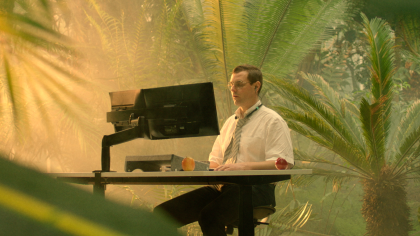Our solutions
Back
Practical tips for making progress at the office
Every office or VDU worker is faced with it at some time: difficulty concentrating. This is definitely so if you work in an open-plan office with all of its distractions. Colleagues consulting with one another, someone else who is on the phone, and another who has a radio on. Here are some practical tips for being able to focus better on your work and get it done more effectively:
- Turn off the e-mail alerts so that you won't be distracted by incoming e-mails. Do the same with the sounds on your mobile phone. And why not do something else you rarely do? Turn off your phone for a few hours so you can really concentrate on your work.
- Check your e-mails periodically – halfway through your workday and again an hour before you go home – not as soon as one comes in. If it's really urgent, they'll call or come and see you.
- Use the last 5 to 10 minutes of the day to make a to-do list for the next day. By doing this, you can get right into your work rhythm on the following day without having to think first about all the things you have to do. This way, you start out cool, calm and collected: You know what you have to do and you can focus better on each task.
- Set your e-mail so that it opens in your calendar. This way, you won't be distracted by a full inbox! You can simply open your e-mail programme in the morning and see only the real deadlines: times when you have a meeting or another important thing you have to do. If you don't know how to do this, look it up in Google: getting started with your calendar with [the name of your e-mail programme].
- Stop multitasking! Complete one task first or devote a certain length of time (60 – 90 minutes) to a task.
- Take a three-minute walk every hour. If possible, get outside – just a walk around the office building or to the end of the street. Exercise gives your brain a recovery time – time for it to actively store information. This also lets you concentrate better when you get back to your workplace. This keeps you working up to speed so that you save time over the day. Yes, you read that right: by taking a little time off, you can work faster and better.
- If you've been doing a good job of focusing on a task or if you've completed one, reward yourself. Take a little walk, play a game of Candy Crush or WordFeud on your phone, or spend a few minutes checking your social media. This also ensures that you don't engage in these distractions during your work tasks. By scheduling your distractions, you recharge your brain for the next task requiring concentration.
- Conduct the task that demands the highest level of concentration during the late morning (between 10:00 and 12:00) when your level of concentration is highest.
- The afternoon is a better time for brainstorming and creative tasks or the somewhat simpler operational tasks.
- What if you work in an open-plan office and you have to concentrate on a certain task? In this case, try to find a quiet spot and let your colleagues know that you don't want to be disturbed for the next hour.
- If you work in an open-plan office, consult with your colleagues about ways to keep the noise down. If you think a consultation with a colleague will last longer than five minutes, find another place to meet.
- Let colleagues know that you don't appreciate their noisy telephone calls. Ask them if they realise what they're doing and if they could lower their voice the next time, or work together on arriving at another solution.
- Chaos at the workplace means chaos in your head. Try to keep your workplace and desk neat and tidy. This will give your brain the least chance of getting distracted.
- Still not making progress at the office? In this case, try to do tasks requiring a lot of concentration at a time when things are calmer in the office or, if possible, save up these tasks to do when you have a telework day.
Need help? We're here for you
Look at our FAQ or contact us
Many customers preceded you
Read about their experience with BakkerElkhuizen
Select your country and language


